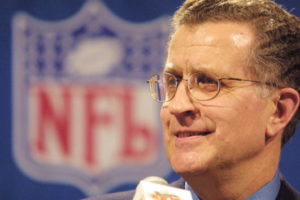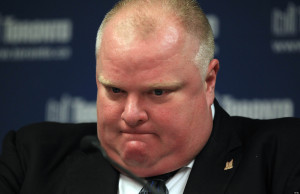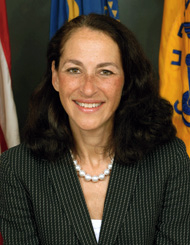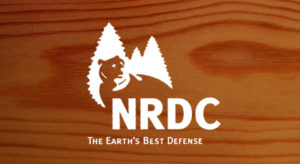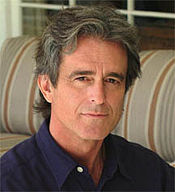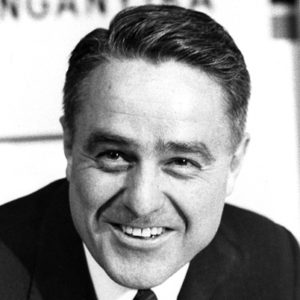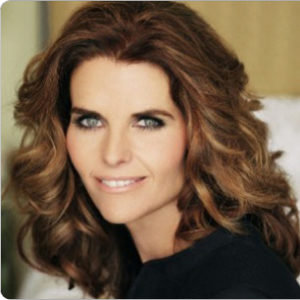The producers of House Of Cards are threatening to stop filming in Washington DC unless the city gives them a special tax break. This is the type of extortion perfected by the NFL. Build us a stadium, or we’ll leave. Cities build the new stadiums convinced they’re creating new jobs. But, as you’ll see in this interview, new stadiums create low paying jobs that never offset the gigantic tax breaks NFL teams are able to coerce from politicians too afraid to take on the fans.
Patrick Hruby writes for SportsOnEarth.com. His most recent article in Politico is entitled ‘The National Freeloader League.’
David: You write that the NFL is a 501(c)6 and that back in 1966, Congress rewrote the tax code so that a 501(c)6 would be tax exempt. So what is a 501(c)6? The NFL is a 501(c)6, what is a 501(c)6?

Despite its incessant calls for patriotism the NFL pays surprisingly little in taxes.
Patrick Hruby: Congress, like a lot of times, they had a decent idea here. A 501(c)6 is supposed to be basically a trade association. So like a local chamber of commerce or maybe the pistachio council for pistachio nuts or something like that, where it’s an association of businesses and it exists essentially to promote that product. But when the NFL and the AFL merged in the ’60s, somehow they had the 501(c)6 language changed to specifically include professional football leagues. Now, the NFL doesn’t generically promote football. It promotes its member clubs. It’s promoting NFL football. All you have to do is put on an NFL game or see an NFL advertisement to realize that that’s what we’re talking about here. They really don’t compare to other trade associations. They’re nothing like your local chamber of commerce, promoting general business welfare. As Senator Tom Coburn has been arguing for a while, and now has legislation to this effect, the NFL doesn’t deserve to have this sort of designation, the law should be changed.
David: Does Senator Coburn represent Oklahoma?
Patrick: He does, which conveniently enough, does not have an NFL team. Quite a coincidence.
David: Yes. And Linda Sanchez? Congressman Linda Sanchez.
Patrick: Linda Sanchez is somebody who is from California who has actually taken on the NFL a lot over head trauma. And, again, right now, California does have NFL teams but not in her district. She’s in Southern California and not in San Diego. She’s in the LA area. So the NFL has not had a team in the LA area for 15, 20 years now.
David: Right.

70% of the money going into new stadiums comes from taxpayers.
Patrick: So it’s definitely something to keep in mind here is that the NFL does have a lot of sort of soft power in Washington and in the halls of Congress. A lot of that isn’t just that, you know, they spend a good amount on lobbying. They spend $1 million to $2 million a year on lobbying. I think they’re up to now four K Street firms that represent them. They’ve increased their lobbying efforts a lot in the last decade to half decade. But they have a soft power, in terms of if you’re an NFL front office, if you’re an NFL owner, it’s very easy to invite a congress person or an important government person up to your owner’s box for a game. You’ve kind of got that sort of schmoozing factor. You’ve got that access factor. You don’t have to necessarily make a big campaign donation to get the ear of somebody. You sort of have this other glamorous way of doing it.
David: It can cost you a lot of money if you’ve got Governor Chris Christie in that skybox, stomach stapling not withstanding. I mean that guy can eat through a lot of your profits. Let’s turn to local pride. Was that funny?
Patrick: I laughed.
David: OK.
Patrick: I’m here.
David: All right. I don’t… Let’s turn to local pride. In the past two decades, you say about 80 stadiums have been built in America. What does your average stadium cost and who pays for it?
Patrick: The costs can vary so wildly, depending on what kind of sport we’re talking about, the size of the stadium, how sort of Taj-Majal-esque you want the stadium to be. But, you know, we’re talking everything from maybe $300 million, $400 million, $500 million, which is a ton of money, to over $1 billion, which is an even bigger ton of money. Let’s put it that way. And people that have studied this, one woman in particular, Grant Judith Long, at Harvard has studied this extensively. The majority of cases, the majority of the money is being paid for by local taxpayers. State and municipal taxpayers. They’re picking up the tab, so we’re talking hundreds of millions of dollars.

Study after study reveals that NFL teams do not create high paying jobs for the local economy.
David: You write that 70% of the capital costs in NFL stadiums is provided by taxpayers. Is that through actual tax or is that through bond issues mostly?
Patrick: Well, that’s the sneaky thing here. It’s that and more. I mean, when we’re talking about the actual total cost, we’re not just talking about construction bonds, which are a huge part of the expense, we’re also talking about tax subsidies. So a stadium is built and then the ownership of the team doesn’t have to pay property tax at all. Or they pay very small property tax. Or much less than what a normal business would pay. We’re talking about all kinds of infrastructure that is built around these stadiums. Everything from roads, sewers, electricity, all that stuff. The public almost always picks up the tab for that. Public transportation to the station. A metro stop is built next to the stadium. The public picks up that cost. We’re also talking about how these bonds funded. I mean, generally, it’s things like hotel taxes, rental car taxes, sometimes there are lottery taxes. The lottery was actually used to help pay for the stadium in Baltimore. For the Baltimore Ravens. As any economists will tell you, lottery taxes are incredibly aggressive. That’s essentially taxing poor people more than rich people. So there’s almost something being morally more offensive about that.
David: Yeah. The taxpayers are subsidizing the building of the stadiums, the teams don’t have to pay property taxes?
Patrick: In a lot of cases, they don’t have to pay property tax or they pay a very reduced rate. There’s a federal layer to all this, by the way. These construction bonds that are issued by the local and state governments to pay for these stadiums? They are also exempt from federal taxes. Again, Congress had a good idea making these kinds of bonds generally exempt because they wanted to encourage states and cities to build schools and roads and hospitals. But stadiums also are kept under this sort of umbrella of being tax exempt. In a Bloomberg News report on this, they estimated that this is costing the federal treasury something like $140 million a year. Which, again, is a significant amount of money.
David: How much? How much?
Patrick: $140 million a year is what Bloomberg estimated.
David: That’s the, just so our listeners understand this and so I understand, local and state bonds, for the most part, if you buy a local and state bond, the interest on it that you collect is exempt from federal taxes. But that’s to encourage the building of bridges and highways and schools?
Patrick: Exactly.
David: Okay.
Patrick: And somehow stadiums are being kept under that same umbrella.
David: Well, they’re kept under that umbrella, Patrick, because stadiums are good for local business. When a team owner threatens to leave, aren’t we going to lose great jobs?

Despite its incessant calls for patriotism the NFL pays surprisingly little in taxes.
Patrick: That’s the other part of the myth here. I mean, every economic study that has not been paid for by a league or a team owner has concluded that there is no economic positive effect from building a stadium. A stadium is not like building roads. It is not like building schools. You are not investing in your future. You are not getting an economic multiplier effect. You are not juicing the economy in any way. You might create a few low paying jobs in terms of food service and parking attendants and things like that. But, for the most part, what you’re doing is putting money into an owner’s pocket. You’re putting it into their pocket in terms of increasing their franchise value. These cities don’t even ask that, if the team is moved or sold, they get a cut of that equity. So they’re not even making good deals on here. And in terms of the return on investment, one economist I talked to, Dennis Coates, over here at University of Baltimore, he told me he looked at local incomes in places where multiple stadiums had been built and that had multiple pro sports franchises. He said that the net effect was a slight reduction in local income, which is astonishing.
David: This is great. Patrick, we have a new mayor in New York City. I think his name is de Blasio. Am I pronouncing that right?
Patrick: You’re right.
David: Mayor de Blasio wants to fund preschool for all by putting an extra tax on the richest 1% and it’s intimated that some Wall Street executives will take Wall Street someplace else. That’s the way cities are always threatened. If you tax us, we’ll move. If you won’t build us a stadium, we’ll move. In 1999, you write that the Senate had a solution for this. What would it be called? Greenmail? Or what would you call this? Blackmail?
Patrick: Yeah, for this, basically this is a form of civic extortion. Right. So, you’re right. I’m glad you brought up Wall Street. This doesn’t just happen in sports, but sports are a great way to look at it. So, essentially, the owner of the team says, ‘Build me a new stadium, or I’m going to move to Los Angeles. Or I’m going to move to Portland. Or I’m going to move to Washington D.C. Or wherever it is that I can get a deal for a stadium.’ It’s been termed, basically, the war of the states or the war of cities, where we’re tripping over ourselves to give out corporate welfare, essentially. And, like I said, it’s not just for stadiums. This Senate bill, what it would have done, it’s brilliant. It would have slapped a 100% federal excise tax on any state or local spending that was designed to benefit a single industry or a single company. So, if the Seattle Seahawks or UPS said to the city of Seattle or said to the city of Tacoma or wherever, I don’t know, wherever UPS is located, if they said, ‘Look, give us a new building. Give us a tax break or we’re leaving.’ The city could have said, ‘Well, fine, but you’re going to have to pay 100% excise tax on whatever benefit you’re getting from us.’ Therefore, the team owner would have no incentive to ask for that money. Instantly, all this sort of pitting cities against each other, pitting states against each other, it would’ve been defused.
David: What is an excise tax?
Patrick: It’s just basically slapping a tax on that kind of transaction. So it’d be like, if you do this then you automatically have to pay this tax to the federal government. It’s almost more of a threat than something you expect to carry through with, in a way.
David: Suppose Microsoft says, ‘We want to build a factory in Texas.’ and they go shopping around for tax breaks.
Patrick: Right. Whatever tax break they would’ve gotten, they would then have to pay 100% of the break they got back to the federal government. So, essentially, they would have no incentive to move in the first place.
David: Patrick Hruby writes for SportsOnEarth.com, his most recent article in Politico is entitled, ‘The National Freeloader League’. Patrick, thank you for joining us.
Patrick: Thanks for having me on.
Listen to the original broadcast
What do you think? I’d like to hear. Please join the conversation below:
Read More »





